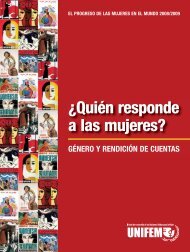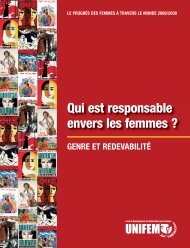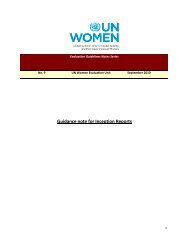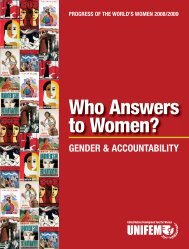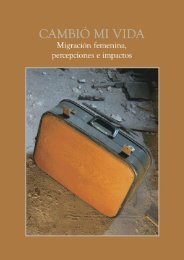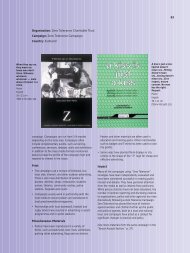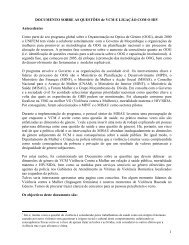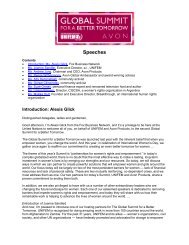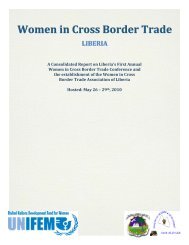W omen Building Peace and Preventing Sexual Violence - UN Women
W omen Building Peace and Preventing Sexual Violence - UN Women
W omen Building Peace and Preventing Sexual Violence - UN Women
Create successful ePaper yourself
Turn your PDF publications into a flip-book with our unique Google optimized e-Paper software.
22<br />
Challenges with radio as a<br />
communication tool for w<strong>omen</strong><br />
Challenges to radio-based initiatives include the fact that<br />
few w<strong>omen</strong> own radios, <strong>and</strong> even fewer can afford batteries<br />
to run them, so men often control whether <strong>and</strong> when<br />
w<strong>omen</strong> can listen. Efforts should thus be made to supply<br />
wind-up <strong>and</strong> solar-powered radios to w<strong>omen</strong>, <strong>and</strong> w<strong>omen</strong>-specific<br />
programmes should be broadcast at times<br />
when they are most likely to tune in. 33<br />
then took part in further theatre workshops <strong>and</strong><br />
received training in non-violent conflict-resolution<br />
skills. The aim was to develop networks of diverse<br />
young men <strong>and</strong> w<strong>omen</strong> who have the skills<br />
<strong>and</strong> confidence to become community leaders.<br />
Indeed, several of the young people involved<br />
have since become involved in conflict mediation<br />
in their families <strong>and</strong> communities. 36<br />
Challenging local power<br />
structures <strong>and</strong> men’s<br />
behaviors<br />
Even when w<strong>omen</strong> face considerable social exclusion<br />
at the community level, they can be successful<br />
in challenging local power structures <strong>and</strong><br />
men’s behaviors to prevent SGBV.<br />
The w<strong>omen</strong>’s anti-alcohol movement in Andhra<br />
Pradesh, India, was started <strong>and</strong> sustained<br />
by poor, low-caste, often agricultural working<br />
w<strong>omen</strong> in response to the violence experienced<br />
at the h<strong>and</strong>s of alcoholic men. Men’s drinking<br />
also exacerbated family poverty through the<br />
squ<strong>and</strong>ering of male earnings on alcohol. 37 The<br />
w<strong>omen</strong> invoked the support of priests, pressuring<br />
men into taking an oath of abstinence at the<br />
temples <strong>and</strong> involving the temples in monitoring<br />
alcohol abuse. W<strong>omen</strong> also prevented the<br />
men in the community from consuming alcohol<br />
by using community-based sanctions on men<br />
who drank, including strategies such as parad-<br />
ing the drunk men around the community, refusing<br />
to give them food, <strong>and</strong> shaving off their hair.<br />
They stopped liquor sales by destroying shops<br />
<strong>and</strong> dens; countered the joint attacks of drunken<br />
men, police <strong>and</strong> thugs; <strong>and</strong> dem<strong>and</strong>ed an end to<br />
the practice of paying male labour in the form of<br />
liquor. The movement was successful in forcing<br />
the Andhra Pradesh state government to ban the<br />
sale of arrack (liquor) in October 1993 (this prohibition<br />
was subsequently revoked).<br />
Another example is the ‘Imam Initiative’ of the<br />
Noor Education Centre, an NGO in Jalalabad, Afghanistan.<br />
The initiative addresses religion, custom<br />
<strong>and</strong> culture as tools for attitudinal change. 38<br />
Discussions are held with religious leaders on<br />
issues such as w<strong>omen</strong> <strong>and</strong> Islam, sharia law<br />
<strong>and</strong> the Koran. Human rights issues are subsequently<br />
introduced. This initiative has seen some<br />
success in changing ideas through religion, especially,<br />
when imams use Friday prayers as a<br />
venue to discuss w<strong>omen</strong>’s issues.<br />
Communications materials addressing violence against<br />
w<strong>omen</strong>, such as this billboard, are common in Liberia.<br />
(Photo: Annalise Moser/<strong>UN</strong>IFEM)



